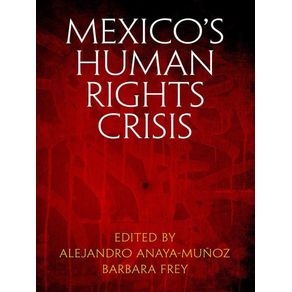Lawless elements are ascendant in Mexico, as evidenced by the operations of criminal cartels engaged in human and drug trafficking, often with the active support or acquiescence of government actors. The sharp increase in the number of victims of homicide, disappearances and torture over the past decade is unparalleled in the country's recent history. According to editors Alejandro Anaya-Muñoz and Barbara Frey, the "war on drugs" launched in 2006 by President Felipe Calderón and the corrupting influence criminal organizations have on public institutions have empowered both state and nonstate actors to operate with impunity. Impunity, they argue, is the root cause that has enabled a human-rights crisis to flourish, creating a climate of generalized violence that is carried out, condoned, or ignored by the state and precluding any hope for justice.
Mexico's Human Rights Crisis offers a broad survey of the current human rights issues that plague Mexico. Essays focus on the human rights consequences that flow directly from the ongoing "war on drugs" in the country, including violence aimed specifically at women, and the impunity that characterizes the government's activities. Contributors address the violation of the human rights of migrants, in both Mexico and the United States, and cover the domestic and transnational elements and processes that shape the current human rights crisis, from the state of Mexico's democracy to the influence of rulings by the Inter-American Court of Human Rights on the decisions of Mexico's National Supreme Court of Justice. Given the scope, the contemporaneity, and the gravity of Mexico's human rights crisis, the recommendations made in the book by the editors and contributors to curb the violence could not be more urgent.

